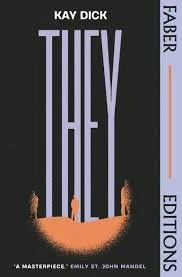They by Kay Dick
Publisher - Faber
Published - Out Now
Price - £9.99 paperback £6.49 Kindle ebook
This is Britain: but not as we know it.
THEY begin with a dead dog, shadowy footsteps, confiscated books. Soon the National Gallery is purged; eerie towers survey the coast; mobs stalk the countryside destroying artworks - and those who resist.
THEY capture dissidents - writers, painters, musicians, even the unmarried and childless - in military sweeps, 'curing' these subversives of individual identity.
Survivors gather together as cultural refugees, preserving their crafts, creating, loving and remembering. But THEY make it easier to forget ...
Lost for half a century, newly introduced by Carmen Maria Machado, Kay Dick's They (1977) is a rediscovered dystopian masterpiece of art under attack: a cry from the soul against censorship, a radical celebration of non-conformity - and a warning.
The phrase cancel culture gets thrown around a lot. The idea that a groupthink will take out those considered impure. I’m sceptical of this - I read another article on it this week mentioning a host of names people have dared to cancel - weirdly I am aware all their books are still best sellers, tv and movie shows too continue to be made on their work and all that’s really happened if that their work has been shown outrageously to be problematic or their behaviour hurtful to others. For me that’s nothing new and I strongly believe you can enjoy problematic texts as long as you understand it’s problematic; it very rare over time that views and stereotypes should not get outdated and questioned and it’s a personal choice for how you choose to deal with the author going forward. For me simple sparkling consequences
For me the great disturbing dystopia mosaic novella They is NOT a book about cancel culture. It’s way more interesting this is about state censorship, the true power of art and how this is usually the canary in the coal mine for greater repression to come.
Dick has a series of interlinked short stories not following specific characters but the development of a Britain rapidly being governed by a force only obliquely referred to as They. Each cast in the story are navigating new rules, surveillance and forms of punishment. Books are slowly being removed off shelves, pictures taken away and the creation of art itself increasingly viewed with suspicion and outlawed. The story subtitled ‘A Sequence of Unease’ remarkably lives up to that feeling. Our core characters are artists with a desire to create a culture, paintings, poems and novels but finding that stopped. Books burnt or torn up, art destroyed and increasingly they become outcasts. In small community groups finding movements restricted, under watch and any transgression punished.
We get a juxtaposition of a classic British village life of green fields, afternoon teas and terribly posh names with mandatory television; pop music under put on the streets and the punishment get more severe. A glass artists gets their sculpture in their eyes. A novelist reacting to her book burning gets her own arm held over a flame so badly she now writes with the other. Death sentences become more and more apparent.
it’s not cancel culture though. The art is not being questioned for moral purity it’s art full stop in all forms being outlawed. The artists are not judged for past actions and behaviours they simply get punished for being artists. Censorship is here and the story explores as we progress into how empathy is being discouraged. That which true art should encourage. Couples are better seen to be arguing, grief is punishable by risk, kids are raised to torture animals and bully others. Nature is viewed with suspicion and tower blocks and artificial marinas are considered better places to live. Go outside the borders and now you may never return.
Dick is a great vivid poetical writer and the light of the natural artistic world with this nameless, all powerful state oppressor growing in strength makes the book darker. It’s a reminder that true censorship isn’t debating the merits of a work( it’s not criticism) it is saying this is not allowed and no longer exists and be that in schools, libraries, tv or movies the next step is further resentment of marginalised communities which then as history always shows cross to everyone in the desire that They stay in power.
They is a remarkable dystopian read I loved being disquieted by it but readers should not take the wrong message from it
